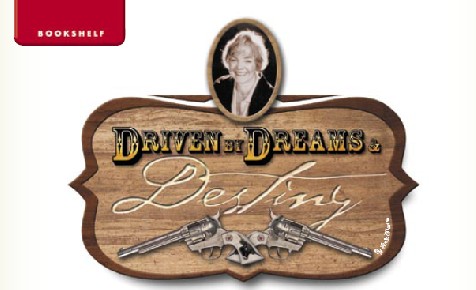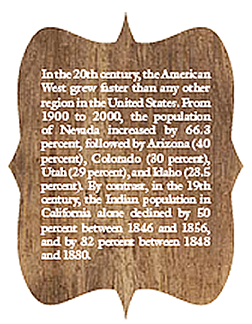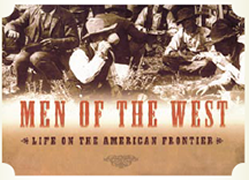
| Vol. 14 No. 2 | Fall 2004 |

Author
Cathy Luchetti portrays the trials and triumphs
of life on the American frontier
By Linda Marion
Men streamed into the Bucket of Blood saloon—a name so popular it appeared all over the West—as well as individual barrooms bearing such lively names as the Crystal Bar, the Smokery-Delta Saloon, and the Come In and Die, where men downed tangleleg, forty rod, tarantula juice, rookus juice, and Taos lightning. An addition of burned sugar with an occasional wad of tobacco thrown in turned barrels of alcohol into the brew of choice.
—Excerpt from Men of the West: Life on the American Frontier, by Cathy Luchetti
The American West has held a fascination for the adventurous of spirit ever since Lewis and Clark’s Corps of Discovery made known the unknown in 1805. Driven by dreams and a destiny deemed manifest, waves of settlers flowed into the West throughout the 19th century, making their claims on the land and its ample opportunities.
The settling of the region occurred rapidly and on a massive scale. The first pioneers who ventured west knew little about the region and had to confront a harsh, if spectacular, landscape. Possible death—from thirst, hunger, heat, cold, sickness, loneliness, or any combination thereof—lurked around every turn in the road.
Author Cathy Luchetti BA’75 taps into that fascination in a series of books focusing on Western lore: Women of the West (with Carol Olwell; 1992), winner of the Pacific Northwest Booksellers Award For Literary Excellence; Medicine Women: The Story of Early-American Women Doctors (1998); Home on the Range: A Culinary History of the American West (1993), winner of The James Beard Award for Best Writings on Food; I Do: Courtship, Love and Marriage on the American Frontier (1995); Under God’s Spell: Frontier Evangelists, 1772-1915 (2000); and Children of the West: Family Life on the Frontier (2001), selected as one of the “Best Books of 2001” by the Los Angeles Times.
 Continuing
in that vein, Luchetti recently published Men of the West: Life on
the American Frontier (April 2004), which recounts the trials and
triumphs of explorers, mountain men, evangelists, doctors, gunslingers,
farmers, cowboys, soldiers, gamblers, outlaws and ordinary men in taming
the frontier, earning a livelihood and wooing the few “decent”
women available in an almost female-free environment.
Continuing
in that vein, Luchetti recently published Men of the West: Life on
the American Frontier (April 2004), which recounts the trials and
triumphs of explorers, mountain men, evangelists, doctors, gunslingers,
farmers, cowboys, soldiers, gamblers, outlaws and ordinary men in taming
the frontier, earning a livelihood and wooing the few “decent”
women available in an almost female-free environment.
The final chapter, “Native Americans on the Land,” is devoted to the Anglo-Indian encounter, which Luchetti describes as “a sorrowful tale in the history of the West,” one in which treaties were repeatedly broken, Indian populations decimated, and their way of life destroyed. The author also paints a colorful picture of the diverse cultural traditions among the approximately 250 remaining tribes.
Populated with excerpts from pioneer diaries, family histories, and personal letters, and enriched with period photographs, Men of the West offers a realistic, intimate look at life on the Western frontier.
Luchetti relies on a network of research organizations across the country for her source material. She has accumulated “a fairly large amount” of data, she says, noting that many library collections are now accessible online, which has facilitated fact-finding. She has also traveled extensively to gather bits of lore that bring her narratives to life.
In the early days of her career as a writer, Luchetti held “all kinds of part-time jobs” while raising two young sons. She devoted as much time as possible to writing, but “it wasn’t easy,” she recalls. “I felt like a pioneer woman.”
Luchetti’s particular attraction to Western lore grew out of a childhood spent in Midland, Texas, during the oil boom of the 1960s. “It was crazy,” she says, “like being in the middle of the 49ers’ gold rush; everyone was on some kind of quest.”
 She
grew up surrounded by stories of pioneers and the taming of West Texas.
Her great-grandparents had been pioneers: one set founded a town in Oregon;
the other headed for California and established a winery, only the second
in the state. Luchetti has “always admired American enterprise,”
which, she says, manifested itself in “raw form” on the frontier.
She
grew up surrounded by stories of pioneers and the taming of West Texas.
Her great-grandparents had been pioneers: one set founded a town in Oregon;
the other headed for California and established a winery, only the second
in the state. Luchetti has “always admired American enterprise,”
which, she says, manifested itself in “raw form” on the frontier.
She admits to having a touch of wanderlust as well, which explains why she found herself in Colombia as a Peace Corps volunteer in the 1960s. She describes the poor, rural villages as “analogous to life in the early West. The idea of figuring out where food would come from was a huge challenge,” she says.
Luchetti’s exploring spirit eventually led her to Utah—to study English at the U. She readily admits that the U’s primary appeal was its close proximity to mountains and skiing.
Currently, she is working on a novel set in her hometown during the oil boom. Although it’s a departure from her historical narratives, Luchetti says the atmosphere that prevailed in Midland in the ’60s “lends itself to the novel form.”
Luchetti travels frequently to Utah to backpack and explore the red rock country. One of her most recent trips was to Utah’s San Rafael Swell, which she describes as, well, “swell.” She finds solace in the deserts of southern Utah, she says, and returns “refreshed” to her home in Oakland, Calif., to begin anew.
—Linda Marion BFA’67 MFA’71 is managing editor of Continuum.